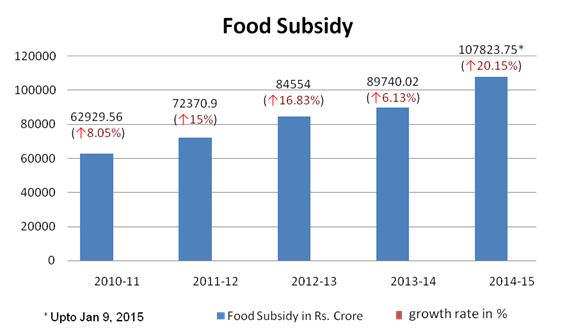| News | |||
|
|
|||
Food Subsidy Bill stands at ₹ 107823.75 crore during 2014-15 (upto January, 2015), shows an increase of 20% over previous year |
|||
| 27-2-2015 | |||
Rationalisation of subsidies and better targeting of beneficiaries will release resources for public investment in agriculture: Economic Survey The Economic Survey 2014-15 has acknowledged that the Food Subsidy Bill has increased substantially in the past few years putting a severe strain on the public exchequer. An amount of ₹ 107823.75 crore has been released as Food Subsidy during the year 2014-15 (upto January 9, 2015). This is a substantial increase of 20.15% over 2013-14 when an amount of ₹ 89740 crore was released as food subsidy.
Provision of minimum nutritional support to the poor through subsidized foodgrains and ensuring price stability in different states are the twin objectives of the food security system. The Economic Survey states that while the economic cost of wheat and rice has continuously gone up, the issue price has been kept unchanged since July 1, 2002. This has resulted in large amounts of subsidy on foodgrains distributed through the TPDS/NFSA and other welfare schemes. The Economic Survey also states that agriculture and food sector needs huge investment in research, education, extension, irrigation, fertilizers, and laboratories to test soil, water and commodities, warehousing, cold-storage. Rationalization of subsidies and better targeting of beneficiaries would release resources for public investment in agriculture. The survey opines that the focus of public expenditure for agriculture so far has been on provision of subsidies (public expenditure in agriculture is only one-fourth of expenditure towards food and fertilizer subsidies, CACP Kharif report 2014-15) and it is time it shifted towards investments to boost productivity. Recommendations of Shanta Kumar Committee provide useful suggestions for the future road-map of food-policy, says the Economic Survey. |
|||


